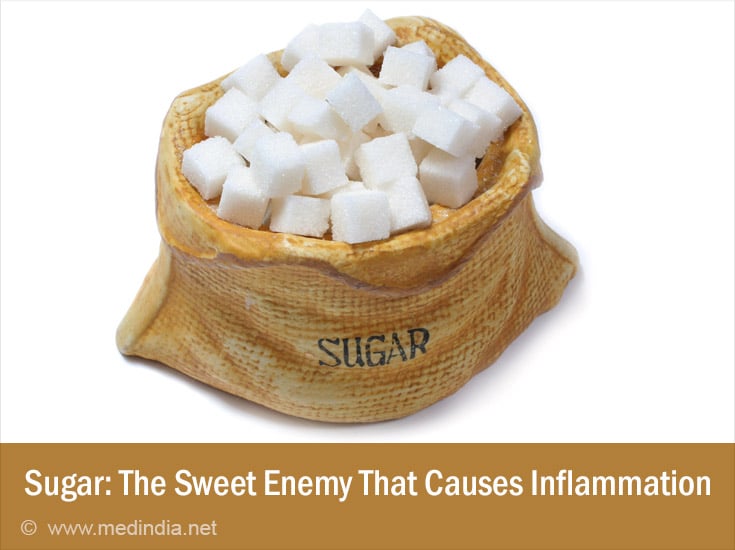- Chronic Inflammation - (https://pubmed.ncbi.nlm.nih.gov/29630225/)
- Omega-6 fatty acids and inflammation - (https://pubmed.ncbi.nlm.nih.gov/29610056/)
- Darkside Of The White Flour - Maida - (https://www.researchgate.net/publication/341394368_Darkside_Of_The_White_Flour_-_Maida)
- Symptoms & Causes of Lactose Intolerance - (https://www.niddk.nih.gov/health-information/digestive-diseases/lactose-intolerance/symptoms-causes)
- Milk and Dairy Product Consumption and Inflammatory Biomarkers: An Updated Systematic Review of Randomized Clinical Trials - (https://pubmed.ncbi.nlm.nih.gov/31089732/)
- Sugar consumption, metabolic disease and obesity: The state of the controversy - (https://pubmed.ncbi.nlm.nih.gov/26376619/)
- Excessive intake of sugar: An accomplice of inflammation - (https://pubmed.ncbi.nlm.nih.gov/36119103/)
- Reduction in saturated fat intake for cardiovascular disease - (https://pubmed.ncbi.nlm.nih.gov/32827219/)
About
Inflammation is the immune system's response to damage or infection, and it can cause a variety of symptoms including redness, heat, discomfort, and swelling. When your immune system identifies a foreign infection or chemical, it activates and causes inflammation. While short-term inflammation benefits your health, it can be dangerous if it persists or becomes chronic. Chronic inflammation has been associated with a variety of disorders, including cancer, heart disease, diabetes, arthritis, depression, and
Chronic Inflammation
Go to source).
Did You Know?
Omega-6 fatty acids in cooking oils can either reduce or promote inflammation, depending on their balance with omega-3s! #inflammation #immunesystem #medindia
Foods that Cause Inflammation in the Body
Many things might trigger inflammation in the body. A bad diet is one of the primary culprits. In fact, using some culinary basics regularly can increase your risk of chronic inflammation. Here's a list of the ingredients:
Cooking Oils
Certain oils, particularly those heavy in omega-6 polyunsaturated fatty acids (PUFAs), such as corn, sunflower, and soy oil, might promote inflammation.
According to a study published in the journal Prostaglandins, Leukotrienes, and Essential Fatty Acids, arachidonic acid (ARA), an omega-6 fatty acid present in the Western diet, plays an important role in inflammation by creating pro-inflammatory chemicals such as prostaglandins and leukotrienes (2✔ ✔Trusted Source
Omega-6 fatty acids and inflammation
Go to source). This has led to the idea that increased omega-6 intake, such as ARA or its precursor, linoleic acid (LA), may induce inflammation.
However, research in healthy adults has indicated that consuming more ARA or LA does not always increase inflammation indicators and, in some situations, may even decrease inflammation. Despite this, a diet heavy in omega-6 fatty acids may counteract the anti-inflammatory effects of omega-3 fatty acids. The relationship of omega-3 and omega-6 fatty acids in inflammation is complicated and poorly understood.
Refined Flour
Refined flour (also known as maida) can induce inflammation in the body. It is a refined carbohydrate devoid of fiber and nutrients and degrades quickly, resulting in a sudden surge in blood sugar. Maida also has a high Glycemic Index (GI) (3✔ ✔Trusted Source
Darkside Of The White Flour - Maida
Go to source), which can cause the formation of advanced glycation end products (AGEs), which promote inflammation. This surge may trigger an inflammatory reaction. Furthermore, it can promote gut inflammation, which can harm the metabolic system and contribute to weight gain.
Dairy Products
In general, dairy products such as milk, cheese, and yoghurt are high in vital minerals including calcium and vitamin D. However, they can cause inflammation and intestinal discomfort in some people, particularly those with lactose intolerance or casein sensitivity.
Lactose intolerance occurs when the body does not have enough lactase, an enzyme required to break down lactose, a sugar found in milk (4✔ ✔Trusted Source
Symptoms & Causes of Lactose Intolerance
Go to source). This causes symptoms such as bloating, gas, and diarrhea. Casein sensitivity, on the other hand, is an immunological reaction to casein, a protein found in milk, that causes inflammation, stomach cramps, and discomfort.
For many people, dairy consumption can cause gastrointestinal irritation as well as systemic inflammation, particularly if ingested on a regular basis. As a result, many people with these diseases prefer lactose-free or plant-based dairy products. However, some research indicates that dairy products have no negative impact on inflammation or have anti-inflammatory qualities in healthy people (5✔ ✔Trusted Source
Milk and Dairy Product Consumption and Inflammatory Biomarkers: An Updated Systematic Review of Randomized Clinical Trials
Go to source).

Refined Sugar
Excess sugar consumption is frequently connected to health issues such as obesity, cardiovascular disease (CVD), type 2 diabetes, and metabolic syndrome (6✔ ✔Trusted Source
Sugar consumption, metabolic disease and obesity: The state of the controversy
Go to source). Sugar induces inflammation by boosting blood sugar and insulin levels, resulting in oxidative stress and inflammatory reactions. It promotes toxic substances such as pro-inflammatory cytokines and AGEs, destroys tissues, and changes the gut flora, resulting in increased inflammation. Over time, this exacerbates chronic inflammatory disorders and weakens the immune system.
A study published in the journal Frontiers in Immunology found that the consumption of sugary drinks and processed foods has increased, contributing to chronic low-grade inflammation and exacerbating conditions such as rheumatoid arthritis, multiple sclerosis, psoriasis, Inflammatory Bowel Disease (IBD), and cancer (7✔ ✔Trusted Source
Excessive intake of sugar: An accomplice of inflammation
Go to source). These findings underscore the inflammatory effects of high-sugar diets and emphasize the need to limit consumption.
Processed Meats
Processed meats, such as sausages, hot dogs, and deli meats, are high in preservatives and harmful fats, which can lead to inflammation. They are heavy in saturated fat, which raises the risk of cardiovascular disease. In fact, research published in the Cochrane Database of Systematic Reviews found that lowering saturated fat can reduce cardiovascular events by 17%, with larger reductions associated with lower cholesterol (8✔ ✔Trusted Source
Reduction in saturated fat intake for cardiovascular disease
Go to source).
Inflammation is an integral part of the body's immune response to infections and disorders. However, if it becomes chronic, it can result in major health problems such as heart disease, arthritis, Alzheimer's, and cancer. It is critical to identify and treat chronic inflammation as early as possible. Consult a doctor to determine the cause and treat it efficiently.









